Fulfilled
 |
| Cairo, a church built over one of the places tradition says the Holy Family stayed while in Egypt |
Read Matthew 2:13-23.
Three times in this short passage, Matthew uses the formula of fulfillment, so perhaps this is a good time to mention how Matthew (and the other New Testament writers) use the Old Testament. First of all, for them, it wasn't the "old testament." It was the Bible, and there was still some discussion in their day as to which books belonged and which ones didn't. Unlike some other faiths, our holy Scriptures did not drop down from heaven fully completed. They were written, edited and discussed; scholars today still debate when the final form of the Old Testament canon was in place. (And, in fact, Protestants, Catholics and Orthodox still disagree as to what books should be included.)
Nevertheless, the New Testament writers (though they didn't know they were writing what became the New Testament) utilized their Bible much as we do. In these words, they saw promises and fulfillment, hopes and realizations, prophecies and prose that they sought to apply to their own lives. It's important to remember, though, that even as they read the prophets, they understood (as we often fail to) that the prophets in the Old Testament were not so much predicting the future as telling the people what would happen if they continued to be disobedient. IF you do this, THEN this will happen. The prophets were "forth-tellers" much more than "fore-tellers." Many of them would have been quite happy for their predictions to not come true, because that would mean the people had turned back to God.
So, much of what the prophets spoke and wrote was applicable in their own day. There were events in their time or close to it that were a primary fulfillment. (In fact, some of the reason these particular prophets' words were even written down is because what they said had come to pass.) But when Matthew and the others turned to the Bible, they saw these words in the light of what God had done though Jesus. They saw that there was more to the story, more than the original writers and speakers may have known. Not only was there a primary fulfillment in the prophets' own time, there was also an ultimate fulfillment in Jesus. Those are the discoveries that Matthew is highlighting in passages like today's.
For an example, let's take the first one, found in 2:15, where Matthew quotes Hosea 11:1. In the original passage, God (through Hosea) is remembering the time he first worked with Israel, his beloved people. He called them out of Egypt, using Moses as the deliverer. Hosea is making an historical statement, something that happened centuries before he wrote his prophecy. God called his "son," Israel, out of Egypt. Historical fact. But then Matthew, in recounting the Holy Family's escape to Egypt, their run from murderous Herod, and their return to the Holy Land, remembers that passage. He realizes that just like Israel was called out of Egypt, so was Jesus. That short clip of a verse in Hosea? It applied to Israel and ultimately, Matthew says, it applies to Jesus as well.
This may not be the most "inspirational" post, but it's important for us as we continue to read Matthew's Gospel. He is well-versed (pun intended*) in the Old Testament and wants us to be as well. Moreover, he wants us to see everything that happened then in the light of Jesus now, because he knows and wants us to know that Jesus is the fulfillment of all of the Father's hopes and dreams.
______________
*Though, if you have to explain that the pun is, indeed, intended, doesn't it sort of distract from the pun itself? Hmmm.


Comments
Post a Comment